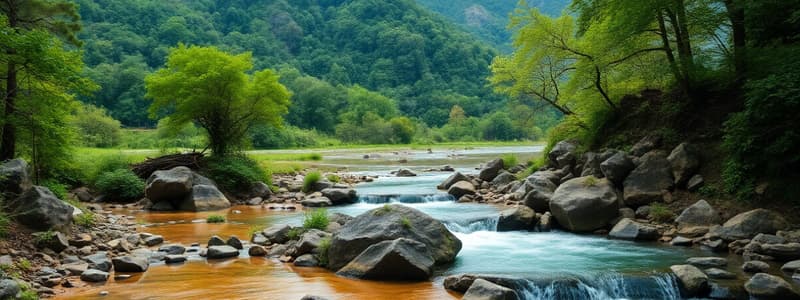Podcast
Questions and Answers
Which of the following best describes factors that regulate population growth?
Which of the following best describes factors that regulate population growth?
- Only reproductive rates of species
- Climatic conditions alone
- Predation, disease, and resource availability (correct)
- Human intervention only
What is typically included in the study of ecosystem ecology?
What is typically included in the study of ecosystem ecology?
- The political impacts of environmental policies
- Interactions between organisms and their environment (correct)
- Historical evolution of species only
- Only the chemical compositions of the soil
Which statement correctly defines biotic and abiotic factors in an ecosystem?
Which statement correctly defines biotic and abiotic factors in an ecosystem?
- Biotic factors only affect population density, while abiotic factors are only climate-related
- Biotic factors are only plants, while abiotic factors are only minerals
- Biotic factors are chemical elements, and abiotic factors are living organisms
- Biotic factors include living organisms, and abiotic factors include non-living physical and chemical elements (correct)
Which concept is a critical component of community ecology?
Which concept is a critical component of community ecology?
What role does the water cycle play in environmental science?
What role does the water cycle play in environmental science?
Flashcards
Hydrosphere Composition
Hydrosphere Composition
The chemical and physical makeup of Earth's water, including freshwater, saltwater, and atmospheric water.
Habitat
Habitat
The natural environment in which an organism lives.
Water Cycle
Water Cycle
The continuous movement of water within the Earth and atmosphere.
Ecosystem Ecology
Ecosystem Ecology
Signup and view all the flashcards
Biotic Factors
Biotic Factors
Signup and view all the flashcards
Study Notes
Study Guide for Second Partial
- Hydrosphere Composition: A key topic to review.
- Habitat: Another crucial concept to understand.
- History and Scientists of Ecology: Learn about the history of ecology and important figures.
- Auxiliary Sciences of Human Geography: Understand the supporting fields of human geography.
- Distribution Patterns: Study the patterns of geographic distribution.
- Water Cycle: Learn the process of the water cycle.
- Human Geography: Focus on the concepts of human geography.
- Ecosystem Ecology: Study ecosystem ecology principles.
- Emergent Properties of Community Ecology: Understand how communities are formed and their characteristics.
- Emergent Properties of Population Ecology: Investigate population ecology and its emergent properties.
- Factors Regulating Population Growth: Focus on the factors that influence population growth.
- Physical and Chemical Properties of Seawaters: Key characteristics and properties of seawater.
- Colonialism: A historical context and its impact.
- Succession Dynamics: Understand the dynamics of ecological succession.
- Seawater Dynamics: The changes and processes in seawater.
- Ecological Restoration: The processes for ecological restoration
- Biotic and Abiotic Factors: Study both living and non-living factors in an ecosystem.
- Demographic Indicators: Learn about demographic indicators and their applications.
Studying That Suits You
Use AI to generate personalized quizzes and flashcards to suit your learning preferences.




